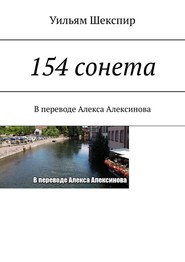скачать книгу бесплатно
154 сонета
Уильям Шекспир
Наконец решился сделать это. 154 сонета – их уже переводили лучшие поэты прошлого и современности. Маршак, Финкель, Брюсов, Мод, Чайковский – огромное количество гениев. Перевод сонетов Шекспира – это не совсем сочинение стихов, это скорее школа, попытка отточить некоторые уже имеющиеся навыки стихосложения.И хоть пел Градский: «сколь ни рисуй себя с великими, не станешь лучше рисовать», но с другой стороны, как почувствовать, кто ты и что ты, если не сравнивать себя с поэтами…
154 сонета
Уильям Шекспир
Переводчик Алекс Алексинов
© Уильям Шекспир, 2020
© Алекс Алексинов, перевод, 2020
ISBN 978-5-0051-3118-8
Создано в интеллектуальной издательской системе Ridero
Сонет №1
From fairest creatures we desire increase,
That thereby beauty’s rose might never die,
But as the riper should by time decease,
His tender heir might bear his memory:
But thou, contracted to thine own bright eyes,
Feed’st thy light’st flame with self-substantial fuel,
Making a famine where abundance lies,
Thyself thy foe, to thy sweet self too cruel.
Thou that art now the world’s fresh ornament
And only herald to the gaudy spring,
Within thine own bud buriest thy content
And, tender churl, makest waste in niggarding.
Pity the world, or else this glutton be,
To eat the world’s due, by the grave and thee.
красы земной не прерывалась нить,
в круговороте вечном вод и снега,
осенним днём куст розы схоронить,
чтобы родиться молодым побегом
но, отразившись в собственных глазах,
огонь души тобою был потерян,
где до тебя прекрасная лоза,
там недород и голод ты посеял
а так хотел собой украсить мир,
провозгласить предвестие Весны,
но твой цветок бутона не раскрыл
скупец, транжира, кем для нас ты был?
в три горла есть -всё тлен и ложь,
в могилу много ль унесёшь…
Сонет №2
When forty winters shall beseige thy brow,
And dig deep trenches in thy beauty’s field,
Thy youth’s proud livery, so gazed on now,
Will be a tatter’d weed, of small worth held:
Then being ask’d where all thy beauty lies,
Where all the treasure of thy lusty days,
To say, within thine own deep-sunken eyes,
Were an all-eating shame and thriftless praise.
How much more praise deserved thy beauty’s use,
If thou couldst answer «This fair child of mine
Shall sum my count and make my old excuse,
Proving his beauty by succession thine!
This were to be new made when thou art old,
And see thy blood warm when thou feel’st it cold.
когда по полю юной красоты
рубцами старости пройдутся сорок зим,
наряд былой, узоры и цветы,
предстанет свету рубищем худым
не отвечай, коль спросят: " где краса,
где спрятано богатство прежних лет?»
не говори, мол: " видите глаза,
сокровища таятся в них, на дне»
достойнее ответ мог быть иным,
он оправдает старости итог,
«моей красой стал мой прекрасный сын,
чтоб, увядая, им гордиться мог»
и кровь холодная теплеет, ведь на свете
уходим тихо, повторяясь в детях…
Сонет №3
Look in thy glass, and tell the face thou viewest
Now is the time that face should form another;
Whose fresh repair if now thou not renewest,
Thou dost beguile the world, unbless some mother.
For where is she so fair whose unear’d womb
Disdains the tillage of thy husbandry?
Or who is he so fond will be the tomb
Of his self-love, to stop posterity?
Thou art thy mother’s glass, and she in thee
Calls back the lovely April of her prime:
So thou through windows of thine age shall see
Despite of wrinkles this thy golden time.
But if thou live, remember’d not to be,
Die single, and thine image dies with thee.
ты в зеркало внимательно вглядишься,
спроси себя: «пришёл ли срок создать
мне копию? "наследником явИшься,
и деву не минует благодать
полей не сеяных найдется сколько,
что ожидают горсть семян твоих,
но если ты в себя влюблен и только,
не будешь жить во временах иных
причудливая связь времён на свете,
так матери увидят в зеркалах
себя! хоть отражались ваши дети,
в апрель далекий юность позвала!
но если в памяти не хочешь ты остаться,
живи один печальным дряхлым старцем…
Сонет №4
Unthrifty loveliness, why dost thou spend
Upon thyself thy beauty’s legacy?
Nature’s bequest gives nothing but doth lend,
And being frank she lends to those are free.
Then, beauteous niggard, why dost thou abuse
The bounteous largess given thee to give?
Profitless usurer, why dost thou use
So great a sum of sums, yet canst not live?
For having traffic with thyself alone,
Thou of thyself thy sweet self dost deceive.
Then how, when nature calls thee to be gone,
What acceptable audit canst thou leave?
Thy unused beauty must be tomb’d with thee,
